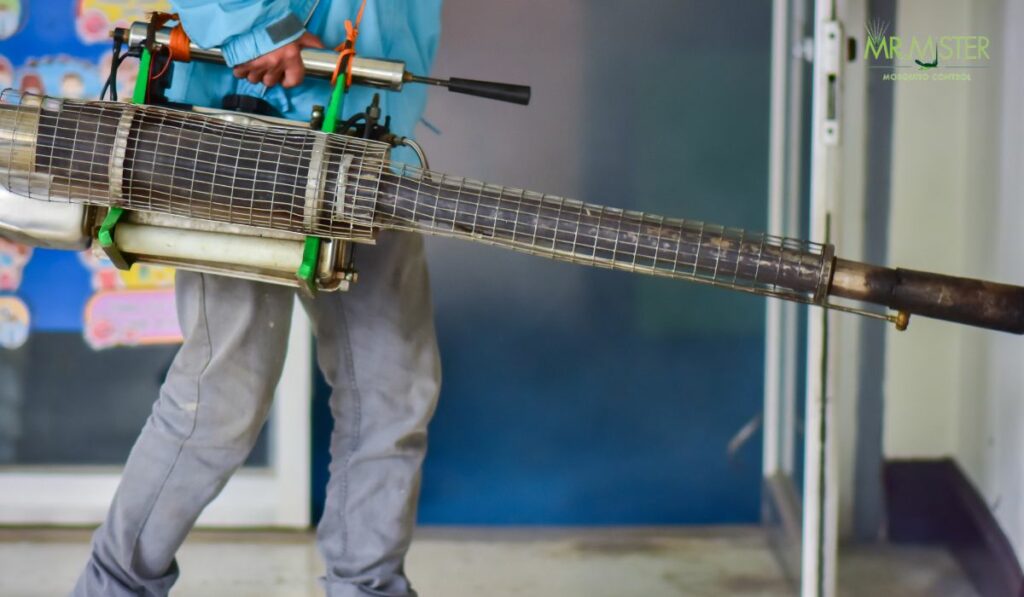Mosquito Control Tips: Why You Should Never Leave Tires In Your Yard
Every good mosquito control professional knows mosquitoes are attracted to stagnant water.
This is precisely where these pests lay their eggs after feeding on your blood.
To give yourself any chance of avoiding a bite from a mosquito, it’s important to drain any containers of standing water while reducing mosquito breeding habitats.
You may have heard of local councils or communities collecting old tires throughout your neighborhood to reduce the mosquito population.
However, why are these pests so drawn to these rubbery cylinders?
Mosquitoes Adore Old Tires
Filled with water and notorious for breeding thousands of mosquitoes, tires are a potential breeding ground for the biting female mosquito.
With that said, that’s not the only reason mosquitoes get comfortable in them.
After lying around for some time, tires can become filled with nutritious leaves for mosquitoes to feed on to gain energy.
Only female mosquitoes suck our blood (they use the protein for breeding purposes), while both male and female mosquitoes eat plant matter for nutrition.
T tires’ thick, rubbery composition also helps provide insulation and protection for mosquito eggs, making them the perfect nest for a new spawn of pests to grow.
How To Prevent Mosquito Breeding in Tires
While any mosquito control professional could say, “Get rid of them,” you never want to make mosquitoes someone else’s problem by simply dumping the issue somewhere else.
With West Nile Virus so prevalent in the United States and the recent onset of the Zika Virus, combined with the sheer amount of tires lying around, properly preventing mosquito breeding in tires is a critical but daunting task for every community.
Here are a few things you can do to prevent mosquito breeding effectively;
- Dispose of any tires in your yard by contacting a tire recycling service, or you could even ask your local council to point you in the right direction.
- Drill holes in unused tires or tire swings for proper water drainage.
- Store your unused tires in closed containers or indoors.
- Cover scrap tires with a plastic cover or tarp (always remember to drain that regularly, as well)
- Shred old tires you may have so that they won’t carry any stagnant water.
- Treat scrap tires with an approved control method, such as the mosquito control solutions offered by Mr. Mister.
We hope you’re finding our Atlanta Mosquito Control blog helpful and informative!
For more information on what makes Mr. Mister Atlanta’s premier provider of innovative mosquito control solutions and techniques, click here. Or, visit our Testimonials page to see what some satisfied customers say.
Conclusion:
Mosquitoes pose a significant health risk, especially with the prevalence of diseases like West Nile Virus and Zika.
Understanding their attraction to stagnant water, particularly in old tires, is crucial to effective mosquito control.
These rubbery havens offer breeding grounds and provide sustenance and protection for these pests.
However, proactive steps can significantly reduce mosquito breeding in tires, from proper disposal and drainage to treatments offered by experts like Mr. Mister’s mosquito control solutions.
Taking responsibility at the community and individual levels is essential to combat these disease-carrying pests.
FAQs:
Why are mosquitoes attracted to old tires?
Mosquitoes are drawn to old tires because they hold stagnant water, an ideal breeding ground. Additionally, the accumulated decaying organic matter provides nutrition for female mosquitoes and serves as a protective environment for their eggs.
What can I do to prevent mosquito breeding in tires?
Several steps can be taken:
- Dispose of tires through recycling services or local council programs.
- Drill holes in unused tires for proper drainage.
- Store new tires in closed containers or indoors.
- Cover scrap tires with a plastic cover or tarp and regularly drain any collected water.
- Shred old tires to eliminate stagnant water.
- Treat tires with approved control methods like those offered by mosquito control services such as Mr. Mister.
How can I find more information about mosquito control solutions?
Visit Mr. Mister’s website for innovative mosquito control solutions and techniques. Additionally, exploring their Testimonials page can provide insights from satisfied customers.
What diseases can mosquitoes carry, and why is it essential to control their breeding sites?
Mosquitoes can transmit diseases like malaria, dengue, Zika, and West Nile Virus. Controlling their breeding sites reduces the risk of these diseases spreading.
Can mosquitoes breed in any standing water, or do specific characteristics attract them to tires?
Mosquitoes prefer stagnant water sources for breeding. Tires are attractive because they collect water, offer shelter, and accumulate organic matter, creating an ideal environment for breeding.
Are there any specific tire sizes or types that mosquitoes prefer for breeding?
Mosquitoes aren’t particular about tire size or type. Any tire capable of collecting and holding stagnant water can become a breeding ground.
How long does it take for mosquitoes to breed in tires?
Mosquitoes can lay eggs in as little as a teaspoon of water, and the larvae can develop into adults within a week or two under favorable conditions.
Is there a specific season when mosquitoes are more attracted to tire breeding sites?
Mosquito activity can vary depending on climate and location, but warmer months with increased rainfall generally create more conducive conditions for mosquito breeding.
Can I use home remedies or DIY solutions to prevent mosquitoes from breeding in tires?
While some home remedies might help, like adding oils that repel mosquitoes or using larvicides, professional and systematic preventive measures are often more effective and sustainable.
Are there any regulations or laws regarding the disposal of tires to prevent mosquito breeding?
Some areas have specific regulations governing tire disposal to prevent mosquito breeding. Local authorities or waste management agencies might provide guidelines for proper tire disposal.
Can I repurpose old tires in a way that prevents mosquito breeding?
Yes, repurposing tires in ways that prevent water collection, such as using them as raised garden beds or filling them with soil for landscaping, can help avoid mosquito breeding.
Are there any natural predators or biological controls that can help manage mosquito populations in tire habitats?
Certain organisms, like some fish species and predatory insects, can feed on mosquito larvae. Introducing these natural predators into standing water can help control mosquito populations.
What are the environmental impacts of improper tire disposal on mosquito breeding?
Improperly discarded tires contribute to mosquito breeding and pose environmental hazards by serving as breeding grounds for other pests and becoming sources of toxic chemicals when they degrade. Proper disposal helps mitigate these risks.
* Schedule a Free Mosquito Control Consultation – 404-941-0720 *
* Guaranteed Results * 100% Biodegradable * Locally Owned







